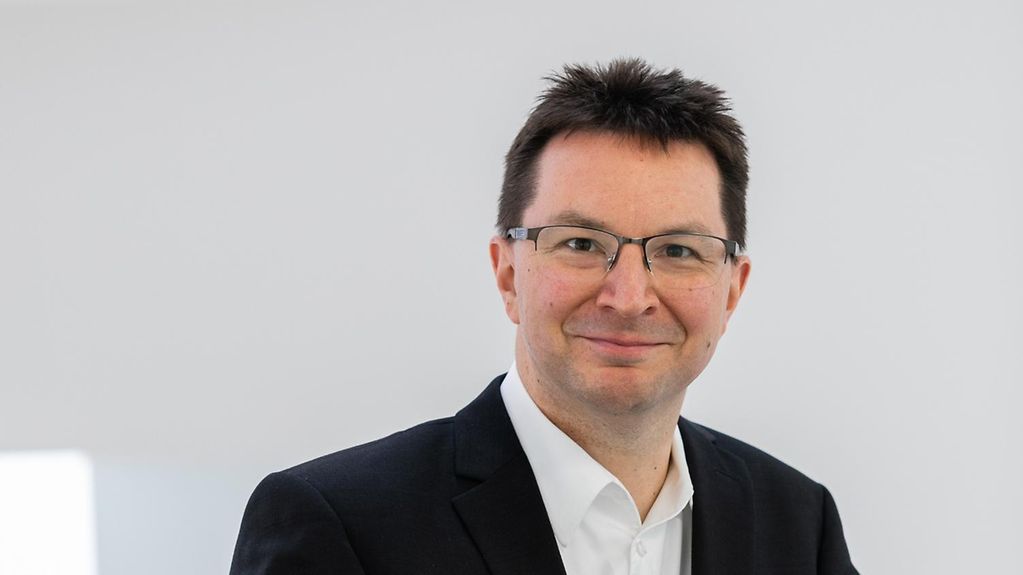Interview
Conspiracy theories are gaining ground during the coronavirus pandemic. Digitalisation helps them to achieve a greater impact, says Dr Michael Blume, member of the commission of federal and state governments (BLK) to combat antisemitism and protect Jewish life. In an interview, he tells us what we as a society must do to tackle this phenomenon, and why conspiracy theory believers are also endangering themselves.
3 Min. Lesedauer

Michael Blume is a member of the commission of federal and state governments to combat antisemitism and protect Jewish life.
Foto: die arge lola / Kai Loges + Andreas Langen
Dr Blume, why do people believe in conspiracy theories?
Michael Blume: There have always been people who believe that the world is controlled by evil powers. From a historical perspective, these myths mostly have misogynistic or antisemitic features. In times of crisis, such conspiracy narratives gain ground. This has to do with a psychological phenomenon: we can respond to crises by relying on science and accepting permanent uncertainties. Or we can choose the supposedly easier way, and pin the blame on evil conspirators. Digitalisation is once again driving this phenomenon, because the conspiracy theories spread much faster worldwide. This is why we are now experiencing that belief in a global Jewish conspiracy, which revolves around an American politician, has also found millions of followers in Germany, France, Turkey and Brazil.
What is the danger of conspiracy theories?
Blume: Belief in conspiracy theories is not only a threat to others, but ultimately to the believers themselves. They distrust doctors, are no longer willing to be vaccinated, or do not accept sensible protective measures, such as wearing a mask. During the pandemic, the problems do not get smaller, but instead become bigger. Because conspiracy theories mean that one doesn’t see oneself as part of the solution. Instead, the blame for everything that goes wrong is attributed to conspirators.
What can be done against conspiracy theories?
Blume: Nowadays, the Internet allows us to become immersed in conspiracy theories overnight. Nevertheless, it takes time for the conspiracy theories to become firm beliefs. That's why working with young people in particular makes a lot of sense. In adults, belief in conspiracy theories can already be very entrenched in the personality. Then, it is more a matter of changing the points of reference, the world view and the social environment. From a psychology of religion perspective, this can be compared to leaving a sect.
Thus, education and integration are required on the one hand, and on the other hand, the rule of law must simultaneously draw clear boundaries, and monitor and prosecute extreme right-wing movements in order to counteract their spread.
You are a member of the commission of federal and state governments (BLK) to combat antisemitism and protect Jewish life – what is the commission doing against conspiracy theories?
Blume: We are following a federal approach, because the federal states and municipalities are more in touch with the regional/local situations. The commission of federal and state governments (BLK) is an important networking tool for doing so. In addition, as a commission, we are strengthening dialogue with science, and supporting local projects through the "Live Democracy!" funding programme.
We observe that conspiracy movements show geographical differences, not only in East-West but also in North-South terms. In southern Germany, for example, many people feel that they do not receive attention in Berlin. The commission wants to change that.
We also see that local newspapers, and with them the political space of the municipality, are losing the attention of the people. Instead, through the Internet, one perceives international politics with burning forests, wars, disasters and catastrophes, and just feels powerless. Today, an entire generation is growing up with these experiences. That is why we need a dialogue with science, government and the media, that consults on the future of the media.
Michael Blume is a religious studies scientist and commissioner of the state government of Baden-Württemberg against antisemitism. As a member of the commission of federal and state governments (BLK), he works with representatives of the federal states to promote the interests of Jewish groups. For several years, he has also been dealing with conspiracy theories. The full name of the BLK is the "commission of federal and state governments to combat antisemitism and protect Jewish life", and it began its work on 18 September 2019.